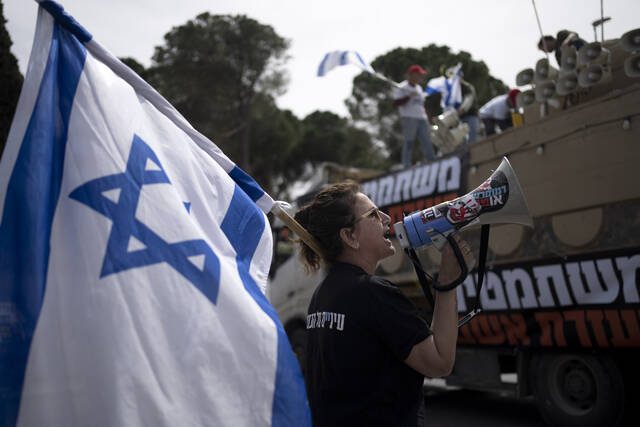JERUSALEM — While Israel fights a long war in Gaza, exemptions from mandatory military service for ultra-Orthodox men have reopened a deep divide in the country and unsettled the government coalition, with Prime Minister Benjamin Netanyahu’s fellow War Cabinet members strongly against his proposed new conscription law.
By the end of this month, Israel’s government must present legislation aimed at increasing recruitment among the religious community. As the deadline nears, public discussion has become increasingly negative — a change from displays of unity earlier in the war.
Netanyahu’s government has managed to survive the public unrest caused by Hamas’ Oct. 7 attack that sparked the war, but the draft issue has put him in a difficult situation. The collapse of the three-member War Cabinet would undermine the country’s stability at a sensitive time in the fighting. But a loss of the ultra-Orthodox parties would bring down his broader governing coalition and lead to new elections as he and his Likud party are performing poorly in opinion polls.
“Politically, this is one of the most tangible threats to the government,” said Gilad Malach, an expert on the ultra-Orthodox at the Israel Democracy Institute, a Jerusalem think tank.
Most Jewish men are required to serve nearly three years followed by years of reserve duty. Jewish women serve two mandatory years. But the politically powerful ultra-Orthodox, who make up roughly 13% of Israeli society, have traditionally received exemptions if they are studying full-time in religious seminaries. The exemptions — and the government stipends many seminary students receive through age 26 — have angered the wider general public.
The Supreme Court has deemed the current system discriminatory and given the government until April 1 to present a bill and until June 30 to pass it.
Yoav Gallant and Benny Gantz — who with Netanyahu make up the War Cabinet — say the prime minister’s proposed law doesn’t go far enough in increasing the number of ultra-Orthodox who will join the army. Critics say some aspects, such as raising the age for exemption, could even reduce the numbers.
Gantz, Netanyahu’s main political opponent, said he’d leave the Cabinet if the enlistment law is weakened or fails to pass by the deadline. Defense Minister Gallant said he’d only support a new law with the backing of Gantz and more centrist members of the country’s emergency wartime government.
The government is made up of ultra-Orthodox and religious ultranationalist parties who were joined in the early days of the war by a faction led by former military generals, including Gantz. The alliance was intended to show unity after Oct. 7, but the parties strongly disagree on the issue of conscription.
After Hamas’ attack, Israel called up 360,000 reservists, its largest mobilization since the 1973 Mideast war. Many have since been released but will be expected to return to active duty in the coming months. The increased reserve duty and talks of extending mandatory service have increased public anger.
Among the majority of Jewish people in Israel, compulsory military duty is mostly viewed as a way for different groups to come together and a traditional experience. The ultra-Orthodox argue that joining the army will endanger their long-standing way of life and that their devoted way of living and commitment to following Jewish rules protect Israel as much as a strong military.
Yona Kruskal, 42, a father of 11 and full-time seminary student, stated, “We would rather die than serve in the Israeli army,” as he and about 200 others blocked traffic in Jerusalem during one of the frequent protests against the conscription law. He added, “There’s no way you can force us to go to the army, because we firmly believe that the army and religion are in conflict with each other.”
During the protest, as the ultra-Orthodox clashed with the police, other Israelis criticized them by chanting “Shame! Shame!”



